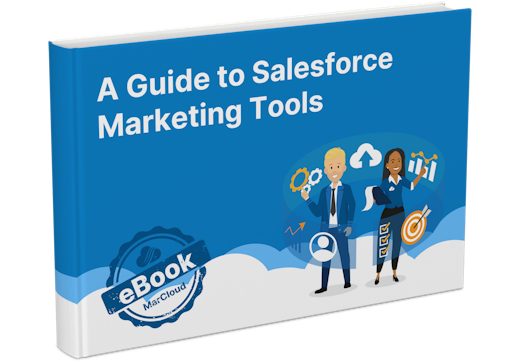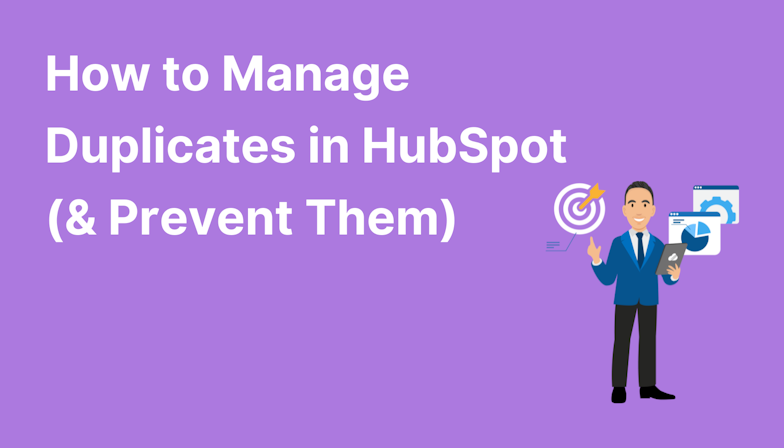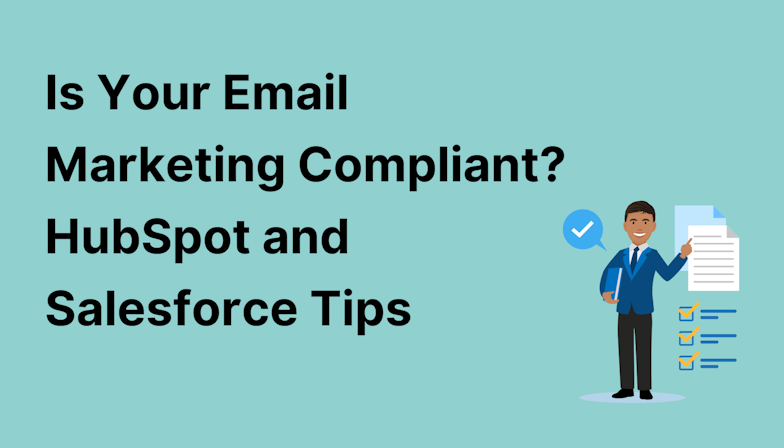3 Predictions for Marketing Cloud by MarCloud’s CEO
With Marketing Cloud Growth being built on the Einstein 1 platform, Salesforce has thrown a bit of a curveball in the marketing automation game.
With Marketing Cloud Growth being built on the Einstein 1 platform, Salesforce has thrown a bit of a curveball in the marketing automation game.
Personally, I’ve never liked the fact Marketing Cloud Engagement has a different user login to Salesforce and Account Engagement. It has always felt a bit separate.
Marketing Cloud Growth though, is built on the same infrastructure as Sales Cloud which means the systems speak completely the same language and you use the same user login.
This move towards having products on the Einstein 1 platform in this way got me thinking about where Marketing Cloud is headed in the future. Before I share my two cents on that, let’s recap the history for those who might not know how Marketing Cloud became what it is today.
Long story short:
Salesforce bought ExactTarget (now Marketing Cloud Engagement) in 2013.
At the time, ExactTarget owned Pardot (now Marketing Cloud Account Engagement).
So, Salesforce got a 2-for-1 on their marketing automation platform purchase, now owning ExactTarget and Pardot.
Both systems are external to Salesforce and had to be developed to integrate more closely.
Salesforce tried to distinguish between the two platforms with a B2B and B2C use case. Sometimes, one would be good for B2B instead of B2C and vice versa so this wasn’t entirely helpful.
Alongside this history, it’s important to bear in mind that Pardot has always been in fierce competition with HubSpot.
With all of this said, it makes sense that Salesforce might ‘start again’ and build a marketing automation tool from the ground up. After all, they have a lot of the ingredients they need to pull together and package a new MAP and they have built a strong customer base they can upsell and migrate.
When Pardot changed names, becoming Marketing Cloud Account Engagement there was a fair bit of backlash from the community.
We have an eBook that runs through the name-change history in more detail. Download ‘A Guide to Salesforce Marketing Tools’.
At the time, we all felt that Pardot being called ‘Marketing Cloud Account Engagement’ made no sense as it wasn’t integrated with Salesforce Marketing Cloud very well. We also knew ‘Marketing Cloud Engagement’ was a separate system to Salesforce (only integrated via Marketing Cloud Connect).
Even internally at Salesforce, some of the teams didn’t support or understand the move and suggested it was nonsensical.
However, a change like this, even after all of the negative feedback, means there clearly is a long-term strategic vision that makes the short-term pain irrelevant because the long-term gains are predicted to be far greater.
Rebranding their suite of marketing products to sit under the same ‘Marketing Cloud’ umbrella was essentially a step towards creating ‘one’ platform. At the time of writing, it’s by name only, but in the future, this will not be the case. This was just step one of the master plan: get the branding pain out of the way, let people adapt, and move on to the technical challenges.
These are the current marketing platforms Salesforce sells as of April 2024:
Marketing Cloud Engagement (previously ExactTarget)
Marketing Cloud Account Engagement (previously Pardot)
Marketing Cloud Growth (new)
With the eBook ‘A Guide to Salesforce Marketing Tools’ in your arsenal, you’ll have a go-to, comprehensive, expert guide to understanding and selecting your perfect Salesforce marketing platform(s).
This isn’t quite a groundbreaking prediction but bear with me…
I think eventually the names Marketing Cloud Engagement and Marketing Cloud Account Engagement will be dropped and all will boil down to ‘Marketing Cloud {{EDITION_NAME}}’.
Currently, Account Engagement editions are:
Growth
Plus
Advanced
Premium
Meaning, you could sign up for Marketing Cloud Account Engagement Growth edition. Or you could sign up for Marketing Cloud Growth.
Confusing? Yes. For now.
Long-term, I expect to see something like this:
Marketing Cloud Growth
Marketing Cloud Plus
Marketing Cloud Advanced
Marketing Cloud Premium
In other words, you sign up for an edition and add on the bits and pieces you need to customise the platform for your business (a bit like how HubSpot operates).
Need advertising capabilities? Add it on.
Need SMS and WhatsApp messaging? Add it on.
Want Einstein to create campaigns for you? Add it on.
Need an increased API limit? You get the gist.
Which then begs the question…
I think they will eventually be sunsetted. By eventually, I’m talking within the next ten years. Tech moves fast but customers do not, so this will be a phased approach.
Important: There is no need to fret, this is just a prediction!
Realistically, with the user licensing business model of Salesforce, it must hurt to know you can pretty much have unlimited Account Engagement users with Identity licenses. It does not align with the business model and unless a customer is buying more prospect blocks or upgrading their edition, Account Engagement isn’t the most lucrative way to upsell to customers.
To confirm, I don’t think a sunset will happen any time soon, but I do believe it is within a 10-year roadmap.
As it stands, Salesforce will be adding new features and functionalities to Marketing Cloud Account Engagement accounts free of charge, as they build on Marketing Cloud Growth.
Eventually, there will come a point where all three technologies start to look a bit similar in terms of feature set and the lines will be (even more) blurred.
If high-quality features that are being built for MC Growth are being given to MCAE customers free of charge, it will make it a lot smoother when the sunset happens. It’s a case of saying, you won’t lose X, Y and Z feature and you’ll actually gain one or two things by switching!
You can assume the product teams in Salesforce have a real focus on developing the on-platform product further (Marketing Cloud Growth), instead of MCAE and MCE which are harder to build upon simply due to having a different system architecture.
I will forever tell people that ‘bad data in means bad data out’. You cannot avoid this principle.
Marketing Cloud Growth is built on the Einstein 1 platform and relies heavily on Data Cloud, which unlocks some seriously powerful capabilities.
But hang on… Marketing Cloud Growth is aimed at SMEs. You know, the companies with really small datasets and small marketing teams. Sometimes it’s actually the founder or CEO running the platform!
In other words, Salesforce is expecting us to believe that SMEs can harness AI to power all of their campaigns and be contextually relevant based on a tiny dataset? It’s a nice idea but AI works well with tens of thousands of data points, and best with millions. Not hundreds or even a couple of thousand.
I believe there will be more editions created with a bigger focus on AI for larger enterprises.
AI continues to pave the way forward, which is brilliant. We were told ‘data is the new oil’ years ago and now we have computing power that can harness all of that data and do clever things with it.
However, let’s take a step back for a second as I ask, how would you use AI today if you had it enabled?
A lot of marketers would be slightly anxious because they are aware that the data in their account probably isn’t in the best shape, in one way or another.
For example, Marketing asks prospects for their job title in a free text field, when Sales are working on a picklist field for Job Function. Misalignment in real life isn’t going to allow AI to help anyone.
We’ve got our thoughts on how AI should be used and promote the 80/20 rule as part of our framework, B2BMA Nirvana.
Someone in the team asked me this on an internal call and I thought it was a really good question.
Years ago it was acceptable to live inside Pardot and simply be a great Pardot techy and marketer.
Today, a Pardot consultant doesn’t exist, only Marketing Cloud consultants. This doesn’t mean you need to know Marketing Cloud Engagement, you can still focus on Account Engagement, but you absolutely must have Sales Cloud skills too.
So, you need marketing skills, Account Engagement, and Sales Cloud experience.
In the future, all Marketing Cloud consultants must have core CRM experience to accompany the marketing and MAP experience but they will also need to have some level of awareness of how to use AI effectively. The ones who can bring data science skills too, with Data Cloud in mind, will be the leaders in the space.
Remember, experience is so much more important than certifications. Focus on upskilling. Don’t be a badge collector.
There are a lot of companies that need help getting their data in order. I still see so many websites not placing the Account Engagement cookie correctly and GDPR came out in 2018. That was six years ago!
Clients will need guidance more than ever because their data is not harmonised, systems aren’t talking to each other, and teams aren’t singing from the same hymn sheet.
MarCloud is ready to service Marketing Cloud Growth customers and has been deep-diving into our demo account ready for the launch in Europe this summer.
We are looking forward to implementing a new platform, migrating customers over from other platforms, and integrating with third-party tools. It’s going to unlock a whole new world of capabilities for our clients and we’re here for it.
Overall, I’m optimistic about the future of Marketing Cloud. Part of the joy I get in what I do is working with a team of seriously adaptable people who are obsessed with solving problems. I know my team is looking at the new product with a sense of excitement and already thinking of ways they can tailor and push the system.
Marketing Cloud Growth also enables us to build more solutions via MarCloud Technologies that are actually built on the Salesforce platform. We’ve become pretty expert in Salesforce APIs, even the ones that aren’t so well documented!
This was a long blog so if you’ve reached the end, thank you for bearing with me! Let me know what you think about the future of Marketing Cloud a LinkedIn message or if you want to speak to one of our team about your current tech stack, drop us a message.
Founder & CEO of MarCloud, Tom has been on both sides of the fence, client-side and agency, working with Salesforce platforms for the best part of a decade. He's a Salesforce Marketing Champion and certified consultant who loves to co-host webinars and pen original guides and articles. A regular contributor to online business and marketing publications, he's passionate about marketing automation and, along with the team, is rapidly making MarCloud the go-to place for Marketing Cloud and Salesforce expertise. He unapologetically uses the terms Pardot, Account Engagement and MCAE interchangeably.
More by Tom RyanWith the eBook ‘A Guide to Salesforce Marketing Tools’ in your arsenal, you’ll have a go-to, comprehensive, expert guide to understanding and selecting your perfect Salesforce marketing platform(s), be it Marketing Cloud Account Engagement (Pardot) or Engagement, and the products available to each.
Download nowIn almost every HubSpot audit we run, we uncover duplicate contacts or companies. Most of the time, teams aren’t even aware there’s an issue. The database has grown alongside new sales reps, new integrations, new forms, and somewhere along the way, a contact was created twice. Or a company record was duplicated because the domain was formatted slightly differently. Once you know duplicates exist, how do you go about managing them?
Tom Ryan
5 mins
Email compliance is one of the biggest risks marketing teams face. Whether you’re using HubSpot or Salesforce tools, it’s crucial to know the data rules in Europe, the UK, and North America. I’ll be the first to admit, this usually means concentrating hard on a blog that reads like legislation, so I’ll do my best to keep it straightforward. To be clear, this isn’t legal advice!
Tom Ryan
8 mins
To implement HubSpot form tracking properly, you need more than a form on a page. Accurate attribution depends on UTMs, cookies, fields, lifecycle logic, and (where relevant) Google Tag Manager and cross-domain tracking. There’s no denying that HubSpot handles form creation and submission capture well out of the box, but reliable campaign-to-revenue reporting only happens after these are in place.
Tom Ryan
7 mins
MarCloud is a team of certified Pardot, Marketing Cloud, and Salesforce specialists. We help businesses to unlock the potential of marketing automation. Join 2,000+ professionals who receive actionable insights to boost their automation performance.
Sign up to the newsletterWith the eBook ‘A Guide to Salesforce Marketing Tools’ in your arsenal, you’ll have a go-to, comprehensive, expert guide to understanding and selecting your perfect Salesforce marketing platform(s).
Download now


